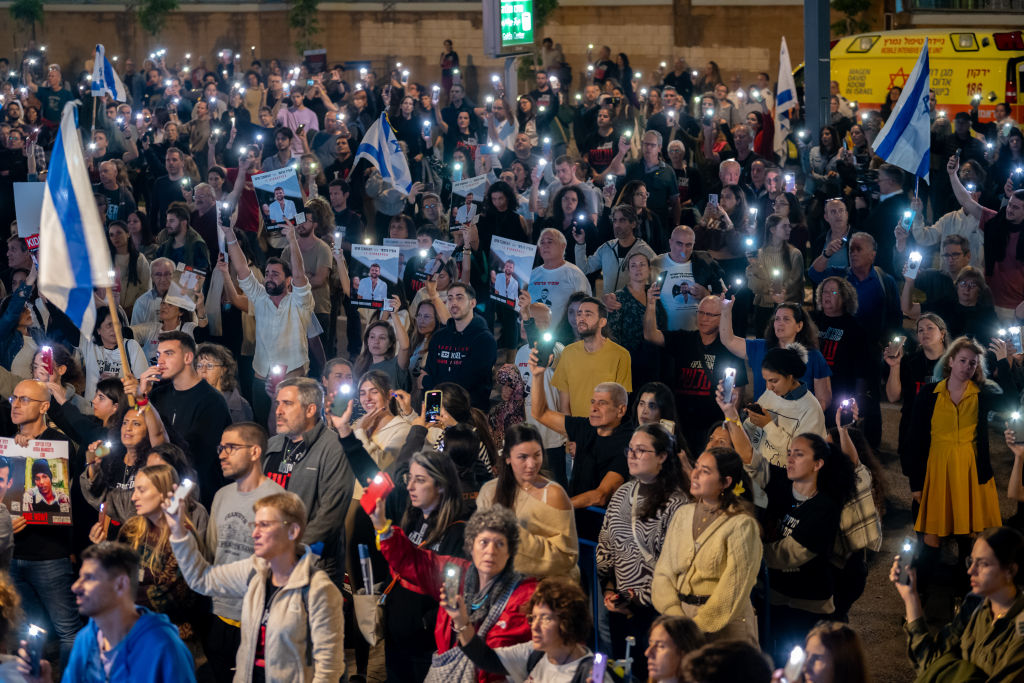Happy Monday! With Thanksgiving now behind us, it’s officially safe to put up those holiday decorations—but we doubt you’ll be able to top these guys.
Quick Hits: Today’s Top Stories
- Israel and Hamas reached a deal last week that included a pause in fighting in addition to the exchange of Palestinian women and minors held in Israeli prisons on charges or convictions of violent crimes for civilians kidnapped from Israel by Hamas during the terrorist group’s October 7 attack. The agreement specified that Israel would release 150 prisoners, Hamas would release 50 Israeli hostages, and Israel would allow 200 trucks of humanitarian aid into Gaza each day. The four-day ceasefire began on Friday and is slated to last through today. So far 39 Israeli hostages have been released by Hamas since Friday in three separate batches, and Israel has released 117 Palestinians. At least 19 additional Hamas-held hostages—most of whom are Thai nationals—were released under separate deals. The latest group of Israeli hostages released Sunday included four-year-old Abigail Mor Edan, a dual Israeli-U.S. citizen whose parents were killed in front of her on October 7. A final group of 11 Israeli hostages is set to go free today under the initial agreement, but Israeli officials have said they would extend the temporary ceasefire another day for each additional 10 hostages released. Meanwhile, President Joe Biden has pushed for the pause in fighting to continue as an additional 10 American hostages remain in Gaza. “That’s our goal: to keep this pause going beyond tomorrow,” he said on Sunday.
- Lebanese Hezbollah launched heavy rocket, missile, and mortar attacks against northern Israel on Thursday, prompting thousands of Israelis in northern communities to take cover in bomb shelters. The barrage involved at least 80 projectiles and followed an Israeli strike on Wednesday evening that killed five Hezbollah fighters, according to the Iranian-backed terrorist group. Israel Defense Forces responded on Thursday by striking rocket launch sites and “terrorist infrastructure” in southern Lebanon.
- Russia on Saturday unleashed the largest drone attack against Ukraine since the war began, launching 75 Iranian-made Shahed drones against Kyiv and the surrounding area in waves during an hours-long, early morning onslaught. Ukrainian air defenses shot down 74 of the drones, according to the Ukrainian air force, but debris from the destroyed drones damaged buildings and wounded at least five civilians. The attack coincided with Holodomor Memorial Day, a day commemorating the anniversary of a famine created by the Soviet Union—and considered a genocide by many European countries—that killed millions of Ukrainians between 1932 and 1933.
- Unknown attackers on Sunday seized and later released a tanker hauling chemicals in the Gulf of Aden. A U.S. naval warship responded to the commercial vessel’s distress call and reportedly detained the attackers as they fled in a boat headed toward Yemen. The ship, named the Central Park and affiliated with an Israeli billionaire, was boarded 54 nautical miles off the coast of Somalia, according to the tanker’s management company. The Yemeni government blamed Iranian-backed Houthi rebels for the attack—a group that had previously threatened to seize the Central Park and hijacked a cargo ship last week in the Red Sea.
- Geert Wilders and his far-right Dutch Party for Freedom (PVV) won a major upset in the Netherlands’ parliamentary elections on Wednesday, securing the largest bloc of seats in the legislative body. In an upset to the center-right People’s Party for Freedom and Democracy (VVD), PVV won 37 of 150 seats in the parliament—a plurality and more than double its 2021 showing. Under outgoing Prime Minister Mark Rutte, VVD had led the governing coalitions in the Netherlands since 2010, but Rutte announced his resignation this past summer following a coalition collapse over disputes on immigration policy. Wilders ran largely on a platform focused on cost of living issues, immigration restrictions, and the Netherlands leaving the European Union. He has a long history of anti-Islam rhetoric and positions, and his campaign platform included calls for banning the the Quran, Islamic schools, and mosques, although he moderated some of his rhetoric during the election. Negotiations to form a new government are expected to take months, and it’s unclear what parties will join Wilders and PVV in a coalition—and whether Wilders will become prime minister.
- Riots erupted in Ireland on Thursday following a knife attack outside a school in Dublin injured five people, including three children, and left a five-year-old girl and a teaching assistant in critical condition. One suspect, a man in his late 40s, was taken into custody and is receiving medical care for serious injuries. A group of anti-immigrant protesters gathered at the scene of the stabbing on Thursday evening after unconfirmed reports circulated online and on social media that the perpetrator was an Algerian immigrant, and far-right influencers called for people to take to the streets. Violence broke out as the crowd grew to at least several hundred, with rioters torching police vehicles and city buses, looting stores, and clashing with the police. As of Friday night, 34 people had been arrested, and Irish authorities were blaming far-right agitators for sparking the riots.
- A gunman shot and wounded three Palestinian college students on Saturday night in Burlington, Vermont. The perpetrator reportedly confronted the group and shot them with a handgun without speaking, leaving two of the students in stable condition and inflicting “much more serious injuries” on the third, according to the Burlington Police Department. Two of the students were wearing Palestinian keffiyeh scarves when the shooting occurred. “In this charged moment, no one can look at this incident and not suspect that it may have been a hate-motivated crime,” said Jon Murad, Burlington’s police chief, though he also emphasized that much remains to be confirmed. “I urge the public to avoid making conclusions based on statements from uninvolved parties who know even less.” Burlington Police arrested a 48-year-old man in connection with the shooting on Sunday afternoon, and additional details are expected at a news conference later today.
- Sam Altman returned to OpenAI last week, just days after the board of the artificial intelligence (AI) research company abruptly fired the longtime CEO because “he was not consistently candid in his communications with the board.” Nearly all of OpenAI’s 770 employees signed a letter protesting the board’s decision and threatening to quit and join Altman in exile at a new AI research organization that Microsoft planned to stand up unless the board reinstated Altman. A new provisional board was created last week, with all but one of the previous board members removed.
A Ceasefire Holds—For Now

In what became a daily occurrence over the weekend, hostages—14 Israeli and three Thai citizens—were released from Gaza Sunday evening as part of a ceasefire negotiation between Israel and Hamas. Observers around the world have held their breath in recent days as a carefully negotiated agreement unfolded in real time, and while Israelis of course welcomed a small number of hostages home, the end of the war remains a long way off. “We have three goals for this war: eliminate Hamas, return all our captives, and ensure that Gaza does not become a threat to the State of Israel again,” Israeli Prime Minister Benjamin Netanyahu said during a trip to Gaza on Sunday, the first time an Israeli head of state has visited the region in two decades. “Nothing will stop us, and we are convinced that we have the power, the strength, the will, and the determination to achieve all the war’s goals, and we will.”
The ceasefire between Israel and Hamas began on Friday, and hostages were released in waves over ...
As a non-paying reader, you are receiving a truncated version of The Morning Dispatch. Our full 870-word story on the Israeli hostage situation is available in the members-only version of TMD.
Argentine of Their Lives

We’re not going to make a “Don’t Cry for Me, Argentina,” joke, we promise—just don’t cry about it.
If we really wanted to poke fun at Argentina’s president-elect, Javier Milei, we’d crack wise about the fact that he calls himself the “lion king”; or about his passel of mastiffs all named after economists and all supposedly cloned from his original, now-deceased dog; or about his propensity wield a chainsaw on the campaign trail; or even about his mop of unruly dark hair and long sideburns that earned him the nickname “The Wig” (though we understand the hair is, in fact, all his).
The self-described “anarcho-capitalist” firebrand’s surprise victory in last week’s presidential runoff could prove to be a sea change in a country long dominated by the ...
As a non-paying reader, you are receiving a truncated version of The Morning Dispatch. Our full 1,403-word story on the Argentine presidential election is available in the members-only version of TMD.
Worth Your Time
- Writing for Works in Progress, Peter Suderman (author of the Cocktails With Suderman newsletter) explored the transformation of cocktails over the last 20 years. “Bars—especially those billing themselves as cocktail bars, but also restaurants with what we now call ‘cocktail programs’—are taking time with their drinks, carefully measuring ingredients, making syrups and infusions in-house,” he wrote. “They painstakingly press and strain fresh juice (or construct acid-adjusted simulacra of the same), reconstruct long-forgotten classics and obscurities, and build novel drinks out of an ever-expanding array of unusual, unexpected, and—even to sophisticated drinkers—largely unknown ingredients.” This, he adds, “is a far cry from the simplistic, slapdash, thoughtlessly boozy drinking culture that ruled from the 1970s through the 1990s. It’s fussy, precise, thoughtful—at times almost overeducated—and it has resulted in a rapid improvement in the quality and creativity of craft cocktails since the turn of the century. This period of improvement has been called the cocktail renaissance.”
Presented Without Comment
Wall Street Journal: Meta Designed Products to Capitalize on Teen Vulnerabilities, States Allege
“‘It’s not ‘regulators’ or ‘critics’ who think Instagram is unhealthy for young teens—it’s everyone from researchers and academic experts to parents,’ Karina Newton, Instagram’s head of policy, wrote in a May 2021 email. … ‘The blueprint of the app is inherently not designed for an age group that don’t have the same cognitive and emotional skills that older teens do.’”
Also Presented Without Comment
The Messenger: Jewish NYC Teacher Hid in Locked Office for Hours While Students Rioted Over Pro-Israel Stance
Also Also Presented Without Comment
The Guardian: Trump Called Iowa Evangelicals ‘So-Called Christians’ and ‘Pieces of S---,’ Book Says
Toeing the Company Line
- In the newsletters: Scott crunched the numbers to prove Thanksgiving is the best holiday, Jonah warned against (🔒) overinterpreting historical “patterns,” and the Dispatch Politics crew spoke with former New Jersey Gov. Chris Christie about his second presidential run—and whether he has a path to the nomination.
- On the podcasts: On the latest episodes of The Remnant, Jonah and Chris engaged in some rank, pre-Thanksgiving punditry and Jonah ruminated on some classic grievances—including the lack of national gratitude and the misuses of the word “fascism.” On today’s Dispatch Podcast, author and journalist Matti Friedman joined Jamie to discuss how a simplistic narrative of the Israel-Hamas war—which cast Israel as the villain—formed, and whether there’s hope for serious journalism in such a conflict.
- On the site over the weekend: Kevin advised against converting the Thanksgiving dinner table into a personal soapbox, Luis reviewed The Holdovers, and Benjamin Storey and Jenna Silber Storey unpacked French thinker Blaise Pascal’s lessons about Christianity and Judaism.
- On the site today: Jay Cost writes about the Constitution and the possibility of bolstering our founding charter without amending it.










Please note that we at The Dispatch hold ourselves, our work, and our commenters to a higher standard than other places on the internet. We welcome comments that foster genuine debate or discussion—including comments critical of us or our work—but responses that include ad hominem attacks on fellow Dispatch members or are intended to stoke fear and anger may be moderated.
With your membership, you only have the ability to comment on The Morning Dispatch articles. Consider upgrading to join the conversation everywhere.